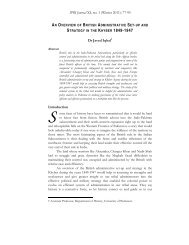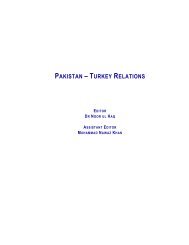120 Whither Kashmir? (Part II) - Islamabad Policy Research Institute
120 Whither Kashmir? (Part II) - Islamabad Policy Research Institute
120 Whither Kashmir? (Part II) - Islamabad Policy Research Institute
Create successful ePaper yourself
Turn your PDF publications into a flip-book with our unique Google optimized e-Paper software.
6 IPRI Factfile<br />
The media is perhaps the only force that can now catalyse the<br />
public opinion to bring about requisite pressure on both governments to<br />
come out of their negative mode and move ahead. The joint Times-Jang<br />
groups' initiative is a timely effort towards generating the needed "surge<br />
of goodwill and flexibility" through Aman ki Asha in civil society and<br />
the media across the borders and might indeed evoke the requisite<br />
popular will in support of peace and normalcy between the two estranged<br />
neighbours. But a word of caution is also needed.<br />
There is no room for over-optimism in the India-Pakistan context.<br />
There is nothing wrong in being optimistic, but given the volatile history<br />
of India-Pakistan relations and complexity of the issues involved, one<br />
would be better off being cautious and realistic, not drawing euphoric<br />
conclusions or raising unrealistic hopes. This has been a troubled<br />
relationship, marked by "conflict and confrontation." In fact, the<br />
underlying problems behind this legacy are rooted in their history and<br />
the long-standing tradition of mutual distrust and suspicion that they<br />
inherited on their independence.<br />
And at the core of all their problems is the <strong>Kashmir</strong> issue, which<br />
has kept the relations between the two countries bedevilled, perpetuating<br />
mutual tensions and animosity. The clash in 1948, the 1965 war, the<br />
Siachin dispute, the Kargil crisis, the volatile Line of Control, frequent<br />
warlike military deployments, the water disputes, including Wullar<br />
Barrage and Baglihar Dam, and Pakistan's strategic fears and<br />
apprehensions are all directly related to <strong>Kashmir</strong>.<br />
The <strong>Kashmir</strong> dispute invokes intense feelings in the peoples of both<br />
India and Pakistan, as well as the <strong>Kashmir</strong>i people themselves. Their<br />
historical experiences, cultural diversities, religious fervour, scars of<br />
partition, wars and conflicts, liberation struggle in <strong>Kashmir</strong> and<br />
resurgence of violence and terrorism in recent years, all come together in<br />
a curious convergence in the unresolved dispute of <strong>Kashmir</strong>. Even in the<br />
most optimistic scenario, <strong>Kashmir</strong> would remain an overarching factor in<br />
any India-Pakistan peace process.<br />
This is not a territorial dispute. It is a question involving the right<br />
of self-determination of the <strong>Kashmir</strong>i people pledged to them by both<br />
India and Pakistan and the international community through solemn<br />
resolutions of the UN Security Council. Both sides will have to involve<br />
the <strong>Kashmir</strong>i people in the dialogue process. They are the arbiters of their<br />
own destiny.




